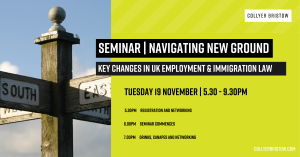- Employment law for employers
- Digital

Longer Reads
Can and should businesses use AI to monitor employees?
In light of MPs recommending firms only use advanced technology to observe workers with their consent, Associate Daniel Zona comments on the efficacy and legalities of tracking staff.
1 minute read
Published 10 August 2023
Key information
The pros and cons of new ways of working – including remote and hybrid arrangements made ever more common since the pandemic – are still hotly debated. But what is evident from Gartner research is that productivity monitoring has doubled since Covid, as employers attempt to keep track of remote teams and their workload.
The research shows that some organisations are using staff monitoring to gauge attendance and productivity and, with technology advances and a host of generative AI tools now available, the process of tracking workers has become a lot easier. And the evidence seems to corroborate this. According to a TUC poll conducted last year, at least 60 per cent of employees feel they have been subjected to some type of workplace surveillance and monitoring. Meanwhile, a CIPD survey of 2,000 senior managers, HR decision makers and line managers indicated that more than half (55 per cent) agree with collecting information on regular home workers, including the amount of time spent on laptops each day and email sending behaviours to identify risk of burnout.
But while employee monitoring is not new, MPs have expressed concerns that employers could be using technology to track their staff without their consent, which in turn leads to feelings of betrayal, resentment and even anxiety.
Striking the balance
According to Gemma Dale, lecturer at Liverpool John Moores University, employee monitoring has always occurred and AI is merely another tool that employers can use, but the “problems and issues remain the same”. The challenge is striking a “balance”, because organisations will typically need to do some sort of performance monitoring to manage efficiently, but this must be “balanced with employee health and wellbeing”, Dale suggests. Excessive monitoring through AI or anything else “works directly against this”.
This level of workplace surveillance can damage trust, have a negative impact on morale and cause stress and anxiety, and excessive monitoring can instead get in the way of performance, rather than improve it.
Ethical and legal considerations
HR and business leaders, according to Anna Campbell, career and HR consultant at Reclaim Your Lane, must be aware of the ethical implications and data security risks when it comes to monitoring, as well as the influence this may have on the workplace dynamic and the employer-employee relationship. For AI to be deployed successfully, “HR needs transparent communication, clear and fair AI practices and open feedback channels”, as well as a focus on employee wellbeing to preserve a sense of safety and security in the workplace.
Using AI to gather people data
From a legal perspective, organisations will need to take personal circumstances into account when monitoring, especially if they decide to take disciplinary action if an employee is not working when they should be. For example, an employer may need to make reasonable adjustments for an employee with a disability, or may need to adapt their policy and procedures for a pregnant employee.
Companies that monitor staff remain bound by all of the same duties as other employers, and, even if they believe they have incontrovertible evidence of wrongdoing gathered through monitoring, they still should conduct fair and reasonable investigation and disciplinary procedures, taking into account any mitigating circumstances. They should not rush to dismissal.
The full article was first published by People Management on 10 August 2023.
For more information, visit our Employment Lawyers page.
Related content
Longer Reads
Can and should businesses use AI to monitor employees?
In light of MPs recommending firms only use advanced technology to observe workers with their consent, Associate Daniel Zona comments on the efficacy and legalities of tracking staff.
Published 10 August 2023
Associated sectors / services
The pros and cons of new ways of working – including remote and hybrid arrangements made ever more common since the pandemic – are still hotly debated. But what is evident from Gartner research is that productivity monitoring has doubled since Covid, as employers attempt to keep track of remote teams and their workload.
The research shows that some organisations are using staff monitoring to gauge attendance and productivity and, with technology advances and a host of generative AI tools now available, the process of tracking workers has become a lot easier. And the evidence seems to corroborate this. According to a TUC poll conducted last year, at least 60 per cent of employees feel they have been subjected to some type of workplace surveillance and monitoring. Meanwhile, a CIPD survey of 2,000 senior managers, HR decision makers and line managers indicated that more than half (55 per cent) agree with collecting information on regular home workers, including the amount of time spent on laptops each day and email sending behaviours to identify risk of burnout.
But while employee monitoring is not new, MPs have expressed concerns that employers could be using technology to track their staff without their consent, which in turn leads to feelings of betrayal, resentment and even anxiety.
Striking the balance
According to Gemma Dale, lecturer at Liverpool John Moores University, employee monitoring has always occurred and AI is merely another tool that employers can use, but the “problems and issues remain the same”. The challenge is striking a “balance”, because organisations will typically need to do some sort of performance monitoring to manage efficiently, but this must be “balanced with employee health and wellbeing”, Dale suggests. Excessive monitoring through AI or anything else “works directly against this”.
This level of workplace surveillance can damage trust, have a negative impact on morale and cause stress and anxiety, and excessive monitoring can instead get in the way of performance, rather than improve it.
Ethical and legal considerations
HR and business leaders, according to Anna Campbell, career and HR consultant at Reclaim Your Lane, must be aware of the ethical implications and data security risks when it comes to monitoring, as well as the influence this may have on the workplace dynamic and the employer-employee relationship. For AI to be deployed successfully, “HR needs transparent communication, clear and fair AI practices and open feedback channels”, as well as a focus on employee wellbeing to preserve a sense of safety and security in the workplace.
Using AI to gather people data
From a legal perspective, organisations will need to take personal circumstances into account when monitoring, especially if they decide to take disciplinary action if an employee is not working when they should be. For example, an employer may need to make reasonable adjustments for an employee with a disability, or may need to adapt their policy and procedures for a pregnant employee.
Companies that monitor staff remain bound by all of the same duties as other employers, and, even if they believe they have incontrovertible evidence of wrongdoing gathered through monitoring, they still should conduct fair and reasonable investigation and disciplinary procedures, taking into account any mitigating circumstances. They should not rush to dismissal.
The full article was first published by People Management on 10 August 2023.
For more information, visit our Employment Lawyers page.
Associated sectors / services
- Employment law for employers
- Digital
Need some more information? Make an enquiry below.
Enjoy reading our articles? why not subscribe to notifications so you’ll never miss one?
Subscribe to our articlesMessage us on WhatsApp (calling not available)
Please note that Collyer Bristow provides this service during office hours for general information and enquiries only and that no legal or other professional advice will be provided over the WhatsApp platform. Please also note that if you choose to use this platform your personal data is likely to be processed outside the UK and EEA, including in the US. Appropriate legal or other professional opinion should be taken before taking or omitting to take any action in respect of any specific problem. Collyer Bristow LLP accepts no liability for any loss or damage which may arise from reliance on information provided. All information will be deleted immediately upon completion of a conversation.
Close
























































































